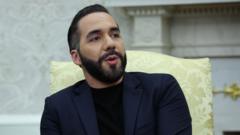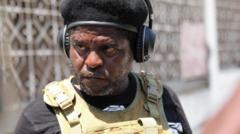El Salvador's President Nayib Bukele has stated that the country will not allow the return of Kilmar Ábrego García, a Salvadoran national wrongfully deported to El Salvador. Despite a US Supreme Court ruling requiring his return, Bukele's government insists it is up to El Salvador to decide. The move highlights the contentious relationship between the US government and Salvadoran authorities, especially regarding deportations linked to alleged gang involvement.
El Salvador Refuses to Return Wrongfully Deported Man Despite US Court Ruling

El Salvador Refuses to Return Wrongfully Deported Man Despite US Court Ruling
President Nayib Bukele announces that El Salvador will not accept Kilmar Ábrego García, who was mistakenly deported from the US, amid ongoing legal and diplomatic conflicts.
El Salvador’s President Nayib Bukele has publicly stated that his country will not facilitate the return of Kilmar Ábrego García, a Salvadoran citizen mistakenly deported from the United States. García was sent back to El Salvador, where he is currently held in a high-security prison infamous for housing alleged gang members. This decision comes amid remarks made by Bukele during a Monday meeting with former President Donald Trump, with whom he shares a significant political rapport.
The situation began when a ruling by the US Supreme Court indicated that the Trump administration must assist in the repatriation of García, who has been living in Maryland with legal protections since a 2019 court ruling. However, the administration has argued that the responsibility lies with El Salvador regarding his deportation status. Notably, US Attorney General Pam Bondi emphasized that "it's up to El Salvador" to choose whether they would accept him back.
In a show of solidarity, Trump praised Bukele for forging a partnership that allows US authorities to deport individuals accused of gang affiliations to El Salvador. García's legal representative has contested the claims made by officials that he is linked to the notorious MS-13 gang, which is labeled a "foreign terrorist organization." Meanwhile, Secretary of State Marco Rubio has disclosed that additional individuals, also purported to be gang members, have been deported to El Salvador despite ongoing legal controversies.
The administration has acknowledged that García's deportation was the result of an "administrative error," yet it maintains that he belongs to the MS-13 group, a claim that García denies vehemently. Amidst this turbulent backdrop, the Trump administration's actions have seen over 200 migrants accused of gang involvement deported to El Salvador under a historical law from 1798.
As concerns over potential human rights violations at the maximum security prison, known as Cecot, escalate, both Trump and other officials have downplayed these reports. García's case underscores the complex and often contentious nature of immigration and deportation policies, as the relationship between the US and El Salvador continues to evolve against a backdrop of security and foreign policy challenges.



















